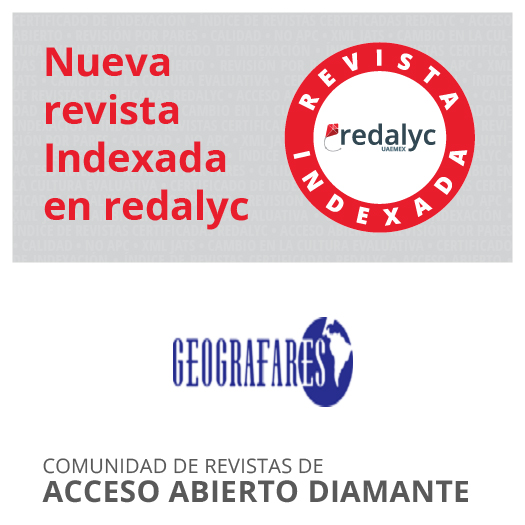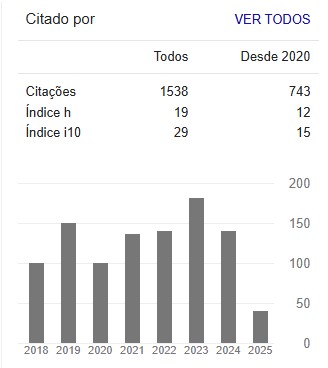Sobre a Revista
Foco e Escopo
- O objetivo da revista é o de difusão do conhecimento científico no campo da Geografia e áreas afins, se pautando pelo rigor e pela qualidade das contribuições. Não são aceitos trabalhos que não sejam resultado de pesquisas (de dissertações, teses e de projetos de pesquisa), organizados segundo as normas de trabalhos científicos.
- O público alvo dos artigos publicados compreende toda a sociedade, com destaque aos pesquisadores dos temas correlatos ao Campo da Geografia e de áreas afins.
- Serão aceitas contribuições na forma de artigos, entrevistas, traduções, resenhas bibliográficas e notas sobre teses, dissertações, etc.
-
Publicamos artigos em português, inglês, espanhol, francês e traduções de artigos aprovados em uma destas três línguas em inglês (conforme as normas da revista)
Processo de Avaliação pelos Pares
Avaliação do trabalho
Serão acolhidos apenas os manuscritos formatados de acordo com estas Diretrizes para Autores e cuja temática se enquadre no escopo da revista. Uma análise preliminar verificará o potencial para publicação e seu interesse para os leitores da revista, também o artigo deverá atender aos requisitos éticos e estar acompanhado de um relatório de plágio do Software CopySpider. Trabalhos que não atenderem a essas exigências serão recusados.
Os manuscritos considerados potencialmente publicáveis na revista Geografares seguem no processo editorial, composto pelas seguintes etapas:
a) Revisão técnica– realizada pelos editores do periódico (desk review). Consiste fundamentalmente da revisão de aspectos de forma e redação científica, para que o manuscrito atenda a todos os itens detalhados nas Diretrizes para autores da revista e esteja apto a ingressar no processo de revisão externa por pares.
b) Revisão externa por pares– O sistema de avaliação é duplo-cego (double blind review), no qual os avaliadores ad hoc não conhecem a identidade dos autores e não são identificados na revisão enviada aos autores. Os trabalhos serão enviados a pelo menos 2 (dois) avaliadores externos especialistas dentre os membros do Conselho Editorial e/ou convidados ad hoc, que avaliarão seu mérito científico e o conteúdo do manuscrito a partir dos seguintes aspectos: originalidade e importância da contribuição, adequação à linha editorial da Geografares, metodologia adequada, cumprimento dos critérios éticos/integridade da pesquisa, relação entre o problema proposto e apresentação/análise dos dados, conclusão respaldada nos dados, clareza, coerência e organização textual, indicação dos principais pontos fortes e fracos do manuscrito. Em caso de discordância nos pareceres recebidos, o artigo será enviado a um novo avaliador, com características similares às dos anteriores, que contribuirá para o desempate. Os editores da revista encaminham a solicitação de avaliação para o especialista com um formulário padrão detalhado. Os avaliadores ad hoc devem seguir as Diretrizes para Avaliadores da revista Geografares, baseadas nas recomendações do COPE (Committee on Publication Ethics), disponíveis em: https://publicationethics.org/files/Ethical_Guidelines_For_Peer_Reviewers_2.pdf. Esse processo de parecer por pares implica o compromisso do(s) autor(es) de atender da forma mais satisfatória e breve possível as observações dos avaliadores. A revista Geografares se reserva o direito de recusar artigos cuja formulação desconsidere as sugestões dos avaliadores sem justificação razoável.
c) Revisão pelos editores– após o recebimento dos pareceres, os editores verificam o material e encaminham para os autores. Nessa etapa, o texto será incluído em uma das três categorias:
(i) ACEITO (aceitação incondicional): o artigo deve ser publicado. O tema é de grande interesse para a área do artigo, é inovador e está bem escrito. Apenas pequenas correções são necessárias, e estas podem ser feitas pela própria equipe de editoração;
(ii) REVISÕES REQUERIDAS (aceitação condicional): alterações de pequeno ou médio porte devem ser conduzidas pelo(s) autor(es), respeitando o prazo estipulado pelos Editores. O artigo deve voltar para reavaliação e os Editores verificam o atendimento às sugestões dos revisores ad hoc ou a justificativa para o seu não atendimento;
(iii) REJEITADO (não aceitação): as modificações necessárias ao artigo são tão extensas, que levariam a um novo artigo; assim, o artigo é recusado e o autor pode encaminhar outro, quando desejar.
d) Revisão de editoração– os manuscritos aprovados serão submetidos à revisão de língua portuguesa e normas técnicas (ABNT). Alguns textos poderão retornar aos autores para consulta e/ou aprovação de eventuais alterações durante o processo. Após essa etapa o manuscrito segue para diagramação, conferência e publicação.
Ressalta-se que, em todas as etapas, poderá ser necessária mais de uma rodada de revisão.
Os avaliadores terão de 15 (quinze) a 30 (trinta) dias para emitirem o seu parecer. O prazo médio de resposta para o(s) autor(es) é de cerca de 120 dias para o primeiro parecer emitido pelos julgadores, de 180 dias para o parecer final e de até 8 (oito) meses para sua publicação, em caso de aceite.
As considerações serão enviadas aos autores com prazo definido para a devolução da versão reformulada do manuscrito. Recomenda-se aos autores atenção às comunicações que serão enviadas ao endereço de e-mail informado na submissão, assim como para a observação dos prazos para resposta. A não observação dos prazos para resposta, especialmente quando não justificada, poderá ser motivo para descontinuação do processo editorial do manuscrito.
A ordem de publicação segue o critério dos editores, considerando a organização temática de cada número e daqueles eventualmente encomendados pelo Conselho Editorial.
O autor deverá acompanhar o processo pelo site da revista, após acesso com seu login e senha para verificar se não existem dúvidas ou solicitações de correções dos revisores.
Periodicidade
A Revista Geografares adota o fluxo continuo de publicações e é semestral, publicando dois números ao ano. Os números podem ser temáticos ou com contribuições variadas.
Política de Acesso Livre
Esta revista oferece acesso livre imediato ao seu conteúdo, seguindo o princípio de que disponibilizar gratuitamente o conhecimento científico ao público proporciona maior democratização mundial do conhecimento.
Princípios éticos e boas práticas
Declaração de princípios éticos da publicação e de boas práticas dos editores da revista Geografares
A publicação de um artigo revisado por pares de maneira autônoma, independente e sem identificação dos autores e dos pareceristas é um modelo essencial para a revista Geografares. Definimos aqui padrões de comportamento ético esperado de todas as partes envolvidas no ato de publicação: o autor, os editores da revista e os membros do Conselho Editorial. Esses princípios estão baseados no COPE’s Best Practice Guidelines for Journal Editors.
Decisões sobre a publicação de artigos
O Editor Geral é responsável pela publicação. O Comitê Editorial é composto pelo Editor Geral e os editores associados. O Comitê Editorial é responsável por decidir a política editorial da revista ouvindo sempre que necessário o Conselho Editorial. As políticas editoriais devem obedecer às exigências legais em vigor sobre difamação, violação de direitos autorais e plágio e outras decisões relativas às publicações.
Transparência e respeito à diversidade
Os editores e o Conselho Editorial devem avaliar os manuscritos submetidos sem levar em conta a raça, sexo, a orientação sexual, a crença religiosa, a origem étnica, a nacionalidade ou a filosofia política dos autores.
Confidencialidade
Os editores e o Conselho Editorial não devem divulgar qualquer informação sobre um manuscrito submetido, a não ser aos pareceristas e os conselheiros editoriais.
Divulgação e conflitos de interesse
Materiais inéditos divulgados em um manuscrito submetido não devem ser utilizados em pesquisas próprias de um editor ou membro do Conselho Editorial sem o consentimento expresso e por escrito do autor.
Deveres dos Pareceristas
Contribuição para as decisões editoriais
A leitura pelos pares auxilia o editor na tomada de decisões editoriais e, por meio das comunicações editoriais, com o autor também pode auxiliar o mesmo na melhora do artigo.
Pontualidade
Qualquer avaliador de artigo que não se sinta qualificado para analisar o artigo ou sabe que a sua imediata leitura será impossível deve notificar imediatamente o editor.
Confidencialidade
Quaisquer trabalhos recebidos para análise devem ser tratados como documentos confidenciais. Eles não devem ser mostrados ou discutidos com os outros, exceto quando autorizado pelo editor.
Padrões de objetividade
Comentários devem ser conduzidos de forma objetiva. A crítica pessoal ao autor é inadequada. Os pareceristas devem expressar seus pontos de vista de maneira clara e apoiados em argumentos.
Sobre as fontes
Os pareceristas devem identificar trabalhos publicados relevantes que não foram citados pelos autores. O parecerista deve chamar a atenção do editor sobre qualquer semelhança substancial ou sobreposição entre o manuscrito em questão e qualquer outro paper publicado de que tenha conhecimento pessoal.
Divulgação e Conflito de Interesses
Informações privilegiadas ou ideias obtidas por meio da leitura por pares devem ser mantidas confidenciais e não utilizadas para proveito pessoal. Os pareceristas não devem ler os manuscritos em que têm interesses ou ainda ter relações com qualquer um dos autores dos artigos.
Direitos e deveres dos Autores
Pesquisas originais
Os autores de trabalhos que se referem à pesquisas originais devem apresentar um relato preciso do trabalho realizado, bem como uma discussão objetiva sobre o seu significado. Dados complementares devem ser representado com precisão no artigo. O documento deve conter detalhes suficientes e referências que permitam, se for o caso, que outros possam replicar o trabalho. Declarações fraudulentas ou intencionalmente imprecisas constituem um comportamento antiético e são inaceitáveis.
Originalidade e plágio
Os autores devem garantir que as obras são inteiramente originais e, se eles utilizam o trabalho e/ou textos de outros, que isso seja devidamente citado. A revista tem uma política sistemática de identificação de plágio utilizando programas de identificação de plágio e exigindo um engajamento dos autores por escrito da originalidade e exclusividade do trabalho. Em caso de identificação de plágio os autores não poderão mais publicar na revista Geografares, bem como a revista se engaja a retirar artigos ou corrigi-los onde seja identificado algum plágio, obrigando os autores a fazê-lo quando necessário. Os editores se engajam a publicar correções, esclarecimentos, retratações e desculpas quando necessário.
Publicação múltipla
Um autor não deve publicar manuscritos que descrevem essencialmente a mesma pesquisa em mais de uma revista. Enviar o mesmo manuscrito para mais de uma revista ao mesmo tempo e/ou publicar o mesmo artigo em mais de uma revista e/ou Anais de Congressos constitui um comportamento antiético de publicação e é inaceitável.
Sobre as Fontes
Os autores devem citar publicações que foram importantes na determinação da natureza do trabalho relatado.
Autoria
Todos aqueles que fizeram contribuições significativas devem ser listados como co-autores do artigo. Todos os co-autores devem conferir e aprovar a versão final do documento e ter concordado com a sua submissão para publicação.
Perigos a seres humanos ou animais
Se o trabalho envolve produtos químicos, procedimentos ou equipamentos que tenham quaisquer perigos incomuns inerentes à sua utilização, o autores devem identificar estes claramente no manuscrito.
Divulgação e Conflitos de Interesses
Todos os autores devem divulgar em seu manuscrito qualquer conflito financeiro ou de outra natureza que possa ser interpretado de forma a influenciar os resultados ou a interpretação de seu manuscrito. Todas as fontes de apoio financeiro para o projeto devem ser divulgadas.
Erros fundamentais em trabalhos publicados
Quando um autor descobre um erro significativo ou imprecisão em seu trabalho publicado é obrigação do autor informar imediatamente o editor da revista ou a editora e cooperar com o editor para corrigir o artigo.
Apoios institucionais da revista
A revista é apoiada pelo EDITAL FAPES Nº 17/2022 APOIO À EDITORAÇÃO E PUBLICAÇÃO DE PERIÓDICOS CIENTÍFICOS a partir de dezembro de 2022.
Agradecemos aos diferentes setores da Universidade Federal do Espírito Santo (UFES) que apoiam nossa revista e permitem que ela se transforme e tenha a configuração atual.
Ficha catalográfica da revista
ISSN: 2175-3709 - Vitória, ES - Dezembro de 2010
Editora da Geografia
Universidade Federal do Espírito Santo
Av. Fernando Ferrari, 514 - Goiabeiras, Vitória - Espírito Santo



























